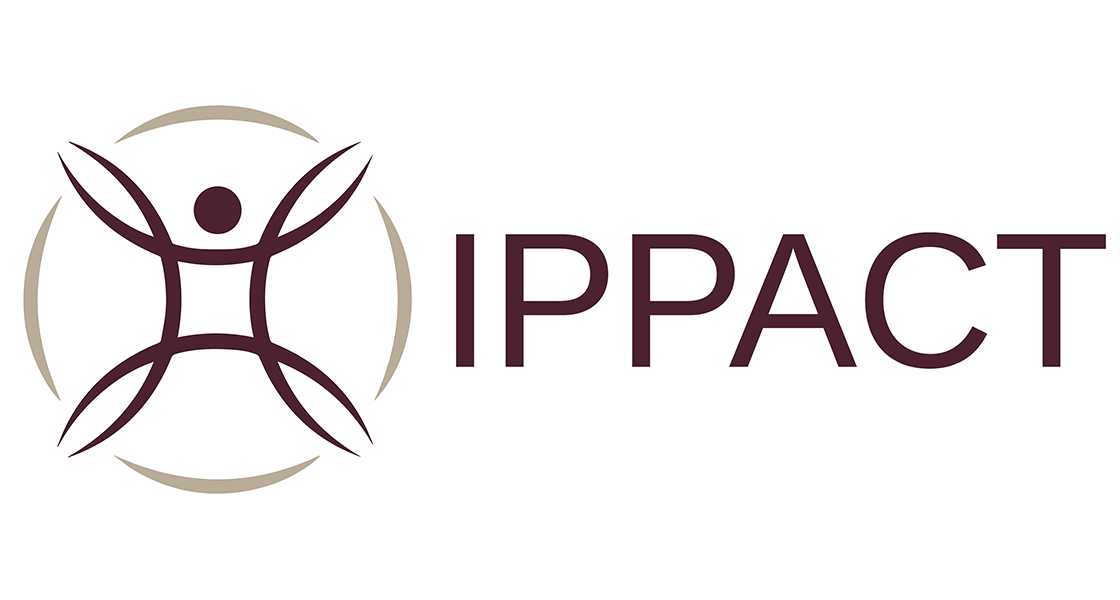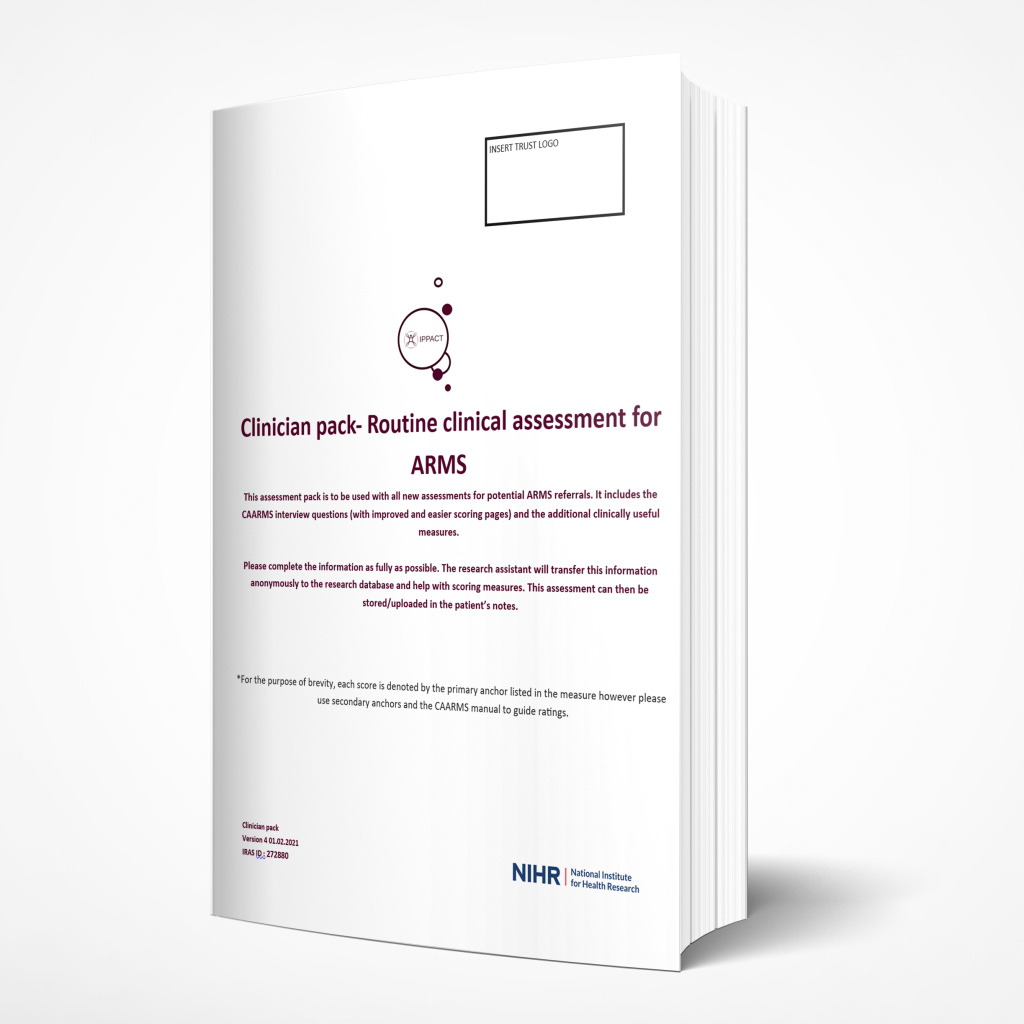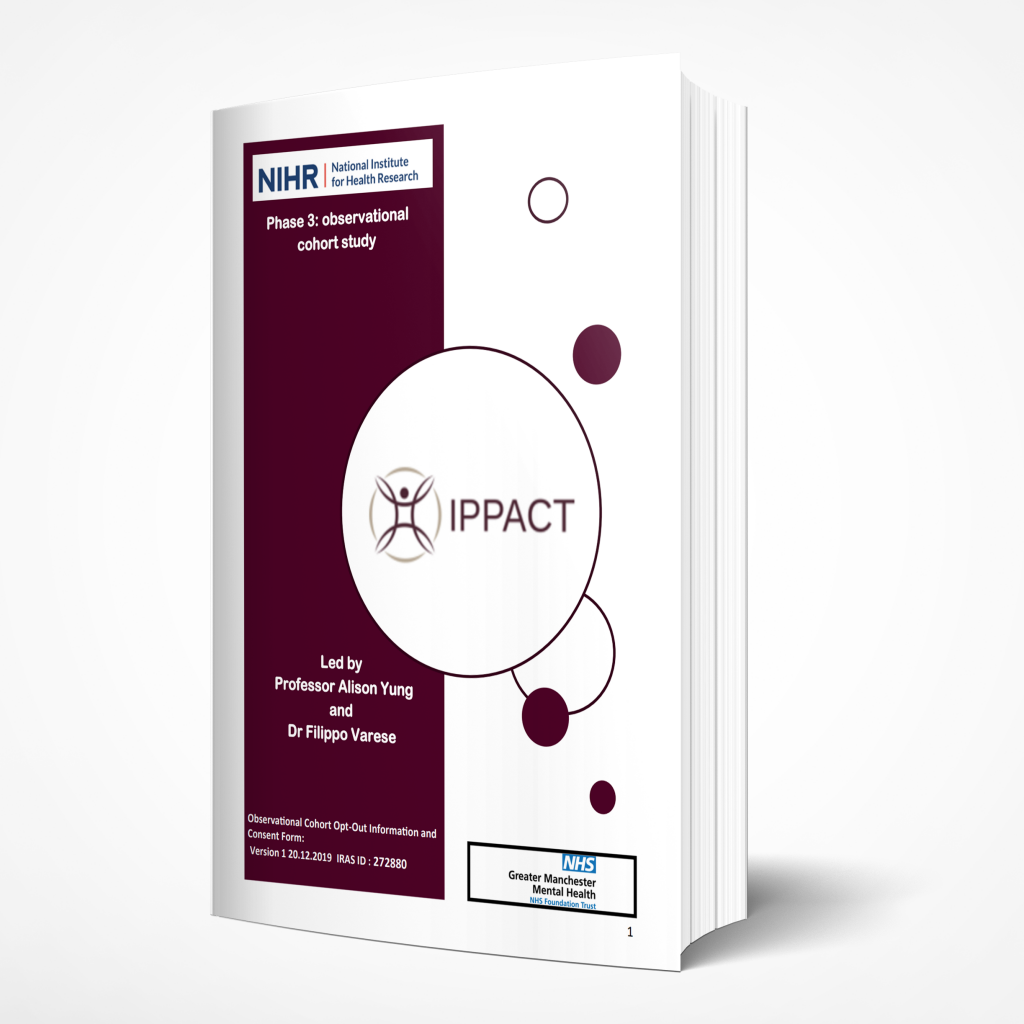IPPACT

IPPACT: Improving Prediction of Psychosis in ARMS using a Clinically useful Prognostic Tool
Led by: Alison Yung, Filippo Varese & Prof Sophie Parker
Why is the IPPACT study important?
We are currently able to identify individuals at high risk of developing a first episode of psychosis using the At-Risk Mental State (ARMS) criteria and the Comprehensive Assessment of At-Risk Mental States (CAARMS)
About 15 – 22% of people identified as ARMS develop psychosis within 12 months – a risk about 400 times that that of the general population.
However, this means most individuals meeting the ARMS criteria will not develop psychosis – so some young people may have unnecessary treatment (those who would not have developed psychosis).
It also means that the NHS may be using a costly treatment, such as CBT (Cognitive Behavioural Therapy) in ARMS services (e.g., EDIT | Greater Manchester Mental Health NHS FT (gmmh.nhs.uk), in people who may not need it. Additionally, some people may be told that they are at elevated risk of psychosis when they are not, creating fear and stigma.
Therefore, we need to improve our ability to predict psychosis within the ARMS group.
Aims of IPPACT
The aims of IPPACT are threefold. Firstly, the project aims to develop a set of measures and a prognostic model for At Risk Mental States (ARMS). This is important as it will help identify individuals who are most at risk of developing psychosis and provide appropriate intervention and support. Secondly, the project aims to assess the external validity of the set of measures and prognostic model for use in the National Health Service (NHS).
This will ensure that the measures and model can be effectively used in real-world clinical settings. Finally, the project aims to assess the health economic impact of implementing this approach in clinical practice. This will help determine the cost-effectiveness of the approach and its potential to improve health outcomes while reducing healthcare costs.
What’s involved in IPPACT?
The IPPACT project has several key components to ensure the successful implementation of its aims. Research assistants are based within the clinical team to assist with data management, assessment tracking, and anonymous data transfer to the research database. This will ensure that data is accurately recorded and easily accessible for analysis. Additionally, all new cases undergo a CAARMS assessment as part of routine practice, which will be supported by CAARMS training and scoring clinics as needed.
To inform the prognostic model, clinicians will also administer additional questions and measures, chosen after consultation with staff and service users across different sites. All new ARMS cases will receive an IPPACT leaflet, which explains that their routinely collected data will be entered anonymously into a research database unless they choose to opt out. This will help ensure transparency and informed consent in the data collection process.
Why is the opt out approach important for IPPACT?
The IPPACT project has adopted the use of anonymised data for several reasons. Using anonymised data will not impose any additional burden on individuals at a time when they are most in need, for help-seeking from services. This approach reduces missing important data meaning we can have the most amount of data available to test the predictive model enhancing the accuracy of the final prognostic model.
The use of anonymised data has been consulted with service users and the ethics committee, who have noted that this approach is common in other health research fields to develop accurate disease risk models.
Furthermore, using this data will help improve the ability to accurately predict psychosis, which is in the interest of public health. The leaflet sent to all new ARMS cases will describe the process of using anonymized data and opting out of the study if this is what they chose to happen.
Optional IPPACT follow up study:
- Participants in the main study will be invited to take part in an additional phase of IPPACT.
- If participants decide they would like to opt in to this part of IPPACT, they will be given a leaflet explaining the study and complete a consent form before their assessment.
- The study will involve meeting with the research 12 months after their baseline assessment to:
- Repeat the CAARMS assessment
- Repeat the prognostic measures
- Answer some questions about their service use and health status
What is the end goal?
The goal of the IPPACT project is to improve the detection of individuals with At Risk Mental States (ARMS) most at risk of transitioning to first episode psychosis. This will allow for better accuracy of where service users’ needs are best met and reduce the risk of services/treatments being used which are not required. Additionally, for more efficient allocation of time and resources within clinical services individuals who need more intensive support can be identified and prioritised.
By improving the accuracy of detecting ARMS individuals, the project aims to enhance the overall quality of care and support provided to those in need. This, in turn, will contribute to better health outcomes and improved public health.
If you want more information about the study please contact:
Heather Law (IPPACT Project Manager)
Heather.law@gmmh.nhs.uk / Ippact@gmmh.nhs.uk
0161 358 1395
Download Resources Here...






